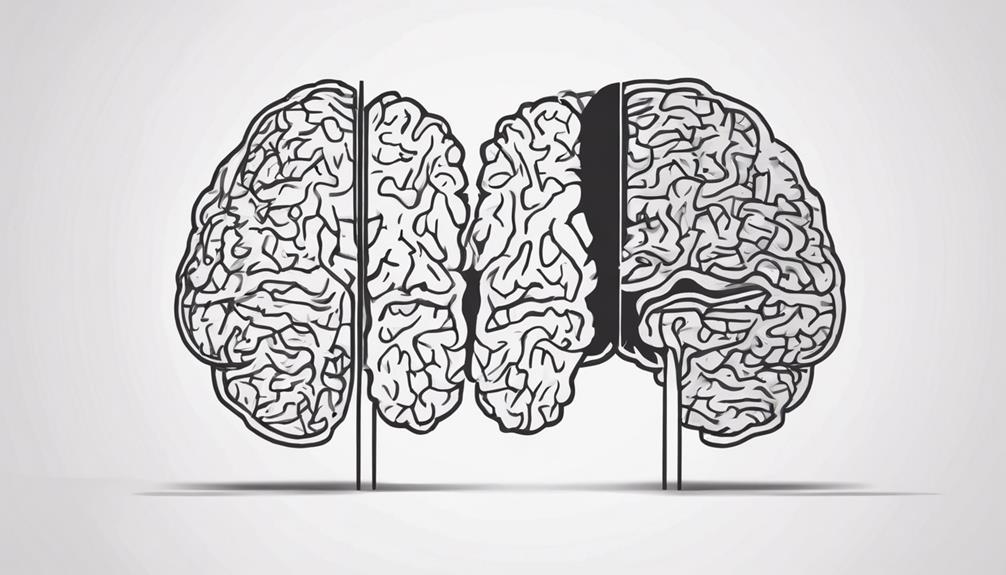Habits, deeply ingrained routines that govern our daily actions, have a profound impact on our lives. They dictate our behaviors, shape our decisions, and ultimately influence our overall well-being. But what exactly is the extent of their influence? Can habits truly define the trajectory of our lives, or are they merely incidental to our success and happiness? Let's explore the intricate web of habits and their implications on our journey through life.
Key Takeaways
- Habits shape daily routines, decisions, and overall well-being.
- Positive routines enhance mental well-being and emotional regulation.
- Behavioral habits influence decision-making and success in life.
- Financial habits impact identity formation and financial stability.
Definition of Habits

Habits, defined as learned behaviors that become automatic over time through the reinforcement of neural pathways in the brain, play a significant role in shaping human behavior and decision-making processes. These patterns of behavior have a profound impact on individuals, influencing daily routines and choices. Neural pathways are crucial in the formation and perpetuation of habits. As individuals repeat a specific behavior, neural connections associated with that action are strengthened, making it more automatic and ingrained.
The impact of habits on our lives cannot be overstated. From simple tasks like brushing teeth to complex activities like driving a car, habits dictate a significant portion of our daily activities. The reinforcement of neural pathways through repeated actions forms the basis of these habits. However, it is essential to recognize that unhealthy habits can also develop in the same manner. When detrimental behaviors are repeated, they can strengthen neural connections, making it challenging to break free from negative patterns. Understanding the role of neural pathways in habit formation is crucial for individuals seeking to cultivate positive behaviors and break free from harmful ones.
Formation Process
In the intricate process of habit formation, neural pathways in the brain are gradually molded through repetitive actions, creating stronger connections between neurons over time. When forming new habits, the brain undergoes changes at a cellular level, with synaptic connections being reinforced or weakened based on behavioral patterns. Habits shape our daily lives more than we realize, influencing our actions and decisions. Understanding how habits form is crucial for comprehending the impact they have on our overall well-being and success.
| Key Points | Description |
|---|---|
| Neuroplasticity | The brain's ability to reorganize itself by forming new neural connections based on experiences. |
| Dopamine Release | Neurotransmitter involved in the brain's reward system, reinforcing behavior that leads to pleasure. |
| Habit Loop | Consists of cue, routine, and reward, playing a vital role in habit formation. |
| Habit Reversal Training | Therapeutic approach focusing on replacing unwanted habits with healthier alternatives through awareness and behavioral interventions. |
Daily Life Influence

The impact of daily habits extends beyond mere routine, permeating various aspects of our lives and significantly influencing our overall well-being and productivity. Habits affect your mental and physical health, with positive habits like regular exercise and healthy eating contributing to improved well-being. By building healthy habits, individuals can create a foundation for a balanced lifestyle. On the contrary, negative habits such as procrastination or poor time management can hinder success and lead to increased stress levels. Daily habits also play a crucial role in shaping our routines, influencing our productivity and efficiency. Habitual behaviors can lead to automatic decision-making, impacting our daily choices without conscious effort. Consistent habits, whether positive or negative, can have a profound impact on our daily lives, highlighting the importance of creating habits that align with our goals and values for overall well-being and productivity.
Behavioral Impact
Behavioral patterns are deeply influenced by the subconscious mechanisms underlying our daily habits. These habits, whether mental or physical, play a significant role in shaping our behaviors on a day-to-day basis. Our minds often operate on autopilot, relying on ingrained habits to navigate through various tasks and decisions. This automatic response system can impact both our mental and physical well-being. For instance, habitual responses can influence our mental health by affecting our stress levels and emotional responses. Similarly, physical habits such as exercise routines or dietary choices can have a direct impact on our physical health.
Moreover, these habits not only influence our daily routines but also play a crucial role in decision-making processes. The lifestyle patterns we adopt as a result of our habits can have long-term consequences on our overall well-being. Therefore, understanding the behavioral impact of our habits is essential in making conscious efforts to change ingrained behaviors that may not be serving our best interests.
Success in Life

Our habits serve as the cornerstone for achieving success in various facets of life, with successful individuals attributing their accomplishments to consistent and structured behavioral routines. Research indicates that having well-defined habits can significantly boost productivity and aid in goal attainment. Habits such as effective time management, setting clear objectives, and engaging in continuous learning play pivotal roles in driving success across different domains.
Success in life is often a result of daily practices that foster growth and development. High achievers understand the importance of cultivating positive habits like resilience and adaptability, which enable them to navigate obstacles and emerge stronger. The impact of habits on success is profound, evident in the disciplined daily practices and growth mindset of individuals who consistently excel in their endeavors.
In essence, success is not merely a product of chance or innate talent but is intricately linked to the habits and daily practices that individuals choose to adopt. By consciously shaping their behaviors and routines, individuals pave the way for sustained success and fulfillment in various aspects of their lives.
Physical Well-Being
Cultivating habits that prioritize physical well-being is paramount for maintaining optimal health and vitality. To achieve this, individuals should focus on incorporating the following habits into their daily routine:
- Regular Exercise: Engaging in physical activity not only improves cardiovascular health but also enhances overall well-being. Exercise helps in maintaining a healthy weight, strengthening muscles and bones, and reducing the risk of chronic diseases.
- Healthy Eating Habits: Adopting a balanced diet rich in essential nutrients is crucial for physical well-being. Healthy eating habits can prevent nutritional deficiencies, boost energy levels, and support overall health and vitality.
- Physical Activity: Small lifestyle changes like taking the stairs instead of the elevator can have a significant impact on physical health. Engaging in physical activities releases endorphins, which help in reducing stress, improving mood, and promoting overall well-being.
Mental Well-Being

Establishing positive daily routines can significantly impact stress levels, directly influencing mental well-being. The consistency and structure provided by these routines play a key role in fostering emotional stability and resilience. Understanding the link between habits and stress management is essential in promoting a healthy mind.
Positive Daily Routines
Developing and maintaining positive daily routines plays a crucial role in promoting mental well-being by enhancing emotional regulation and reducing stress.
Benefits of Positive Daily Routines:
- Improved Emotional Regulation: Engaging in healthy habits like meditation and journaling can have a positive effect on emotional well-being.
- Stress Reduction: Consistent routines, such as regular exercise and good sleep habits, help in lowering stress levels.
- Enhanced Stability: Establishing daily rituals can create a sense of control and stability, leading to a more positive mindset.
Incorporating these habits into daily life fosters a sense of accomplishment, boosts self-esteem, and provides a solid foundation for better mental health overall.
Impact on Stress
The impact of stress on mental well-being is a significant factor that can be influenced by habitual stress management practices. Engaging in healthy coping mechanisms such as meditation, exercise, and relaxation techniques can effectively reduce stress and anxiety levels. Breaking the cycle of negative habits like overthinking and perfectionism is crucial in promoting mental well-being and lowering stress. Additionally, establishing positive habits like regular physical activity, adequate sleep routines, and effective communication can play a vital role in managing stress levels. By incorporating these habits into daily life, individuals can enhance their resilience, promote a sense of well-being, and effectively reduce the negative impacts of stress on mental health.
Relationship Dynamics
Effective relationship dynamics are integral to the overall well-being and satisfaction of individuals in personal connections. When examining the impact of habits on relationship dynamics, several key factors come into play:
- Healthy Habits: Engaging in healthy habits such as active listening and compromise can significantly improve relationship dynamics. These practices promote understanding, empathy, and cooperation, leading to stronger and more fulfilling connections between individuals.
- Communication Habits: Communication habits play a crucial role in shaping relationship dynamics. Expressing gratitude, empathy, and honesty fosters open and effective communication, which in turn strengthens bonds and builds trust within relationships.
- Negative Habits: Conversely, negative habits like criticism, defensiveness, and lack of communication can have detrimental effects on relationship dynamics. These behaviors create barriers to understanding and can erode the foundation of trust and intimacy within relationships.
Financial Implications

In analyzing the impact of habits on individuals' financial well-being, it becomes evident that poor financial habits can significantly jeopardize one's economic stability and future prospects. Financial habits, such as overspending and impulse buying, can lead to the accumulation of debt and financial insecurity. On the contrary, establishing positive habits like budgeting, saving, tracking expenses, and setting financial goals can contribute to long-term financial stability. By automating bill payments and investments, individuals can avoid late fees and cultivate consistent saving habits, ultimately enhancing their financial well-being.
One crucial financial habit that can greatly influence one's economic status is mindful spending. Mindful spending involves being intentional and thoughtful about purchases, avoiding unnecessary expenses, and prioritizing needs over wants. Cultivating this habit can lead to increased financial well-being by ensuring that money is spent wisely and in alignment with one's financial goals. Overall, the impact of financial habits on individuals' lives underscores the importance of adopting mindful spending practices to secure a stable financial future.
Identity Formation
Analysis of individuals' financial habits reveals a profound correlation between these behavioral patterns and the formation of their identity, underscoring the pivotal role habits play in shaping one's self-image and values. Habits are not just superficial actions; they seep deep into the core of who we are, influencing how we perceive ourselves and what we hold dear. When it comes to identity formation, habits are instrumental in sculpting our self-image, personal values, and character. Here's how:
- Self-Image: Consistent habits, whether positive or negative, gradually construct the mental picture we have of ourselves. If our habits align with our ideals, they can bolster a positive self-image. Conversely, destructive habits can erode our self-esteem.
- Personal Values: Our habits are a reflection of our priorities and beliefs. Over time, they solidify into the values we hold dear, shaping our ethical compass and guiding our decisions.
- Character: Habitual behaviors are the building blocks of character. The repeated actions we engage in form the foundation of our character, influencing how others perceive us and how we navigate the world.
Cultural Influence

Cultural influence plays a pivotal role in shaping the habits we adopt, as it impacts our social conditioning and behavioral patterns. Cultural norms dictate what is considered acceptable or expected, influencing our daily routines and choices. These ingrained cultural habits extend to various aspects of life, including food preferences, social interactions, and communication styles.
Cultural Norms Impact
The influence of cultural norms on individuals' habits is a pivotal aspect of societal behavior and personal development. Cultural norms significantly impact the formation and reinforcement of habits in people's daily lives. This influence is profound due to the following reasons:
- Shaping Behavior: Cultural practices and traditions play a significant role in shaping the habits individuals develop and adhere to in their daily routines.
- Defining Acceptable Practices: Cultural influences dictate the types of habits that are considered acceptable or desirable within a given society, guiding individuals in their behavioral choices.
- Support or Challenge: Cultural norms can either support individuals in maintaining their habits or present challenges that necessitate adapting to new behavioral patterns for social integration.
Social Conditioning Effects
Social conditioning effects, stemming from cultural influence, intricately mold individuals' habits and behaviors in society. Social conditioning shapes our habits by reinforcing cultural norms and expectations, influencing our daily routines and behaviors. This process often leads to conformity as individuals adopt societal norms as habits. Cultural beliefs and values play a crucial role in shaping our habits, impacting choices, preferences, and behaviors in various aspects of life. The influence of social conditioning on habits is pervasive, as individuals internalize and exhibit behaviors that align with the norms of their culture. Understanding the role of cultural influence in shaping habits can provide insight into why individuals exhibit certain behaviors and how societal expectations impact daily routines.
Behavioral Patterns Influence
Behavioral patterns are significantly influenced by cultural factors, shaping individuals' daily choices and routines. Cultural influences play a crucial role in determining the habits people adopt and practice. This impact is seen in various aspects of life, including food preferences, communication styles, relationship dynamics, and work ethics. Social norms and traditions within a culture can dictate the acceptable behaviors and habits, leading individuals to conform to these standards. The diversity of cultural practices worldwide results in a rich tapestry of habits that reflect unique values and beliefs. Understanding the cultural influences on habits is essential for appreciating and respecting the different behavioral patterns observed across societies.
Habitual Mental Health Effects

Understanding the intricate interplay between habitual mental patterns and emotional well-being is crucial in comprehending the profound impact of habits on our mental health. Our mental and physical health are closely intertwined, influenced by both positive and negative habits. Engaging in healthy habits such as regular exercise and adequate sleep can significantly improve mental well-being, reducing stress levels. Conversely, unhealthy mental habits like excessive social media use or negative self-talk can contribute to the development of anxiety and depression.
The importance of habits in mental health is evident in how positive habits like journaling or meditating can enhance emotional regulation and resilience. On the contrary, negative mental habits such as catastrophizing or avoidance behaviors can impair decision-making processes and overall mental well-being. Developing adaptive mental health habits is essential as they promote psychological flexibility and equip individuals with coping skills necessary to navigate life's challenges effectively. By recognizing the impact of our habits on mental health, we can strive to cultivate behaviors that support our emotional well-being and overall quality of life.
Motivational Influence
The influence of habits on motivation is a key factor in driving consistent behavior and progress towards achieving goals. Habits can serve as powerful motivational triggers, propelling individuals forward on their journey to success. Here are three ways in which habits exert their motivational influence:
- Consistency Boost: Establishing positive habits fosters a sense of discipline and commitment. This, in turn, fuels motivation to adhere to these habits, leading to sustained progress and growth.
- Goal Achievement: Habits provide a structured framework for goal attainment. By incorporating goal-oriented habits into daily routines, individuals increase the likelihood of success through regular practice and focused effort.
- Self-Empowerment: Successful habit formation contributes to the development of self-confidence and empowerment. As individuals witness the positive impact of their habits on their lives, they are motivated to continue cultivating behaviors that drive them towards their goals.
Ease of Daily Life

Enhancing efficiency and effectiveness through the incorporation of beneficial habits is pivotal in simplifying and optimizing daily activities. Good habits play a crucial role in shaping our daily routine, impacting our energy levels and overall well-being. By integrating positive habits into our daily lives, we can experience a range of benefits that contribute to the ease of daily tasks.
| Aspect | Impact |
|---|---|
| Daily Routine | Establishing a routine through habits leads to consistency and organization in daily activities. |
| Energy Levels | Adopting habits that promote healthy lifestyle choices can boost energy levels, enhancing productivity throughout the day. |
| Good Habits | Cultivating good habits like exercise, healthy eating, and adequate sleep can have a profound impact on overall well-being and quality of life. |
Purpose and Benefits
With a focus on the significance of habits in daily life, it becomes evident that their purpose and benefits extend far beyond mere routine actions. Healthy habits play a crucial role in shaping our physical and mental well-being, showcasing the Power of Habits in our lives.
- Impact on Physical and Mental Health: Establishing healthy habits such as regular exercise, balanced nutrition, and sufficient sleep can significantly impact our physical and mental health. These habits boost immunity, enhance cognitive function, and reduce the risk of chronic diseases, promoting overall well-being.
- Empowerment and Self-Esteem: Consistent practice of positive habits can boost self-esteem, reduce stress levels, and empower individuals to take control of their lives. By creating a sense of accomplishment and progress, habits contribute to a positive self-image and mental resilience.
- Motivation and Goal Achievement: Habitual behaviors provide predictability and structure, fostering motivation and goal achievement. By streamlining actions and making tasks automatic, habits create a foundation for success, enabling individuals to efficiently work towards their aspirations.
Frequently Asked Questions
What Is the Importance of Habit in Our Life?
Daily routines are the backbone of success, as they shape behavior patterns and foster productivity. Habit formation is essential for self-improvement, enabling individuals to achieve goals efficiently. By automating tasks through habits, individuals conserve mental energy, allowing for focus on more critical decisions. Cultivating positive habits is paramount in optimizing one's life and reaching desired outcomes.
How Your Habits Change Your Life?
Embarking on a journey of self-discovery, we navigate the labyrinth of our daily routine, seeking the path to enhanced productivity and success. Our behavior patterns sculpt the landscape of our existence, shaping the contours of our lifestyle choices and ultimately guiding us towards happiness. Through the prism of habits, we witness the metamorphosis of our lives, as each choice made echoes with the reverberations of our subconscious desires and intentions.
What Are the Effects of Daily Habits?
Daily habits have profound effects on various aspects of our lives. They can significantly impact productivity levels, mental health, physical well-being, self-discipline, time management, and emotional stability. By engaging in positive habits like regular exercise and healthy eating, individuals can enhance their overall well-being and achieve greater success. Conversely, negative habits such as procrastination or poor dietary choices can hinder progress and lead to detrimental consequences in both physical and mental health.
How Does Habits Affect Our Personality?
Behavior patterns influenced by habits play a crucial role in mental conditioning and personality development. Consistent habits shape how individuals respond to stimuli, ultimately molding their character traits and behavioral tendencies. Through habitual actions, individuals reinforce certain qualities, such as discipline or creativity, which become ingrained in their personality over time. Therefore, habits not only impact daily actions but also contribute significantly to the overall development of one's personality.
Conclusion
In conclusion, it is ironic that while habits are often seen as a means to effortlessly achieve goals and improve overall well-being, they can also trap individuals in negative patterns that hinder their progress. Understanding the impact of habits on our lives is crucial in navigating the fine line between beneficial routines and detrimental behaviors. By carefully examining and managing our habits, we can truly harness their power to lead fulfilling and successful lives.
